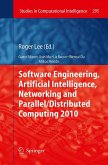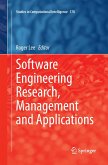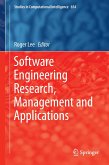th The purpose of the 8 Conference on Software Engineering Research, Mana- ment and Applications (SERA 2010) held on May 24 26, 2010 in Montreal, Canada was to bring together researchers and scientists, businessmen and ent- preneurs, teachers and students to discuss the numerous fields of computer s- ence, and to share ideas and information in a meaningful way. Our conference officers selected the best 16 papers from those papers accepted for presentation at the conference in order to publish them in this volume. The papers were chosen based on review scores submitted by members of the program committee, and underwent further rounds of rigorous review. In Chapter 1, Emil Vassev and Serguei Mokhov discuss their work in creating a Distributed Modular Audio Recognition Framework capable of self-healing using the Autonomic System Specification Language. In Chapter 2, Yuhong Yan et al. present a new model of the Web Service Com- sition Problem and propose a reparative method based on planning graphs. In Chapter 3, Chandan Sarkar et al. explore options for conducting remote usab- ity tests using their newly-developed Total Cost of Administration (TCA) tool to collect and analyze test results. In Chapter 4, Idir Ait-Sadoune and Yamine Ait-Ameur focus on the formal - scription, modeling, and validation of web services compositions and suggest a refinement based method that encodes the Business Process Execution Language (BPEL) model s decompositions.
Bitte wählen Sie Ihr Anliegen aus.
Rechnungen
Retourenschein anfordern
Bestellstatus
Storno








